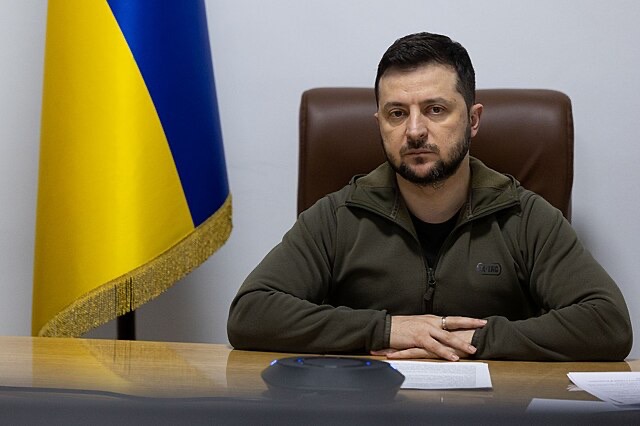Ukrainian President Volodymyr Zelensky has warned Donald Trump that Vladimir Putin is “bluffing” about his desire to end the war, as European leaders scrambled to influence the outcome of Friday’s high-stakes summit between the US and Russian presidents in Alaska.
Speaking at a joint briefing in Berlin with German Chancellor Friedrich Merz on Wednesday, Zelensky cautioned the US president against falling for what he described as Russian manipulation tactics. “I told the U.S. president and all our European colleagues that Putin is bluffing,” Zelensky stated. He is trying to apply pressure before the meeting in Alaska along all parts of the Ukrainian front.
The Ukrainian leader’s stark warning came amid a day of intense diplomacy, with Zelensky flying to Berlin for virtual meetings with European leaders before Trump and Vice President JD Vance joined the conversation. The Europeans sought to present a united front ahead of the Alaska summit, expressing deep concerns about potential territorial concessions to Russia.
According to Chancellor Merz, the European side presented Trump with five key principles for any peace negotiations: Ukraine must be at the table for future meetings with Putin, a ceasefire must be the first step before any negotiations, recognising Russian-occupied territory is not on the table, Ukrainian forces must remain free to defend their sovereignty, and any wider negotiations must be part of a ‘transatlantic strategy.
Russia is trying to show that it can occupy all of Ukraine,” Zelensky warned, adding that he wanted a three-leader meeting and insisting that no talks about Ukraine should exclude Kyiv. The Ukrainian president has been conducting a diplomatic blitz, speaking with more than 30 international leaders in recent days to build support for Ukraine’s position.
The urgency of the diplomatic efforts was underscored by reports that Russia and the US are considering a West Bank-style occupation model for Ukraine to secure a truce. According to The Times, this would mean Russia maintaining military and economic control of occupied Ukrainian territories, a proposal that has alarmed European capitals.
Trump, who has played down expectations for Friday’s summit at Joint Base Elmendorf-Richardson in Alaska, described it as a “feel-out” meeting, stating he would know “probably in the first two minutes” whether a deal could be made. The president has previously suggested that any peace agreement would involve “some swapping of territories,” a concept firmly rejected by Ukraine and its allies.
The summit marks the first standalone meeting between Trump and Putin since 2018, coming at a critical moment as Russian forces have made rapid gains in Ukraine’s Donetsk region. Critics suggest Putin is making a last-minute push to grab territory before the talks, potentially strengthening his negotiating position.
Evidence of this strategy emerged as Donetsk governor Vadym Filashkin announced mandatory evacuations from the mining town of Bilozerske and surrounding settlements now under immediate threat. “We are beginning the mandatory evacuation of families with children,” Filashkin said, revealing that 1,150 children remain in the evacuation zone.
The urgency was highlighted by a Russian strike on Bilozerske on Monday evening that killed two civilians and wounded seven. Despite repeated pleas from officials, civilians remain in active combat zones across numerous settlements in Donetsk, as Russian forces press their offensive.
European leaders participating in Wednesday’s video conference included those from Finland, France, Britain, Italy, Poland, and the European Union, along with NATO Secretary General Mark Rutte. Their joint statement following the meeting emphasised that “the path in Ukraine cannot be decided without Ukraine,” directly challenging any attempt to negotiate over Kyiv’s head.
The Europeans’ anxiety stems from fears that a land swap could leave Russia controlling almost a fifth of Ukraine and embolden Putin to expand further west in the future. They have repeatedly stressed that ceding territory would only encourage Russian aggression, a position strongly supported by Zelensky.
Trump’s approach to the summit has evolved since announcing it last week. Initially, the White House suggested that Putin meeting with Zelensky would be a prerequisite for the Trump-Putin meeting, but the president later walked back this condition, saying “No, he doesn’t” when asked if Putin would have to meet the Ukrainian leader first.
The possibility of Zelensky being invited to Alaska remains under discussion, with a senior White House official saying it is “absolutely” possible, though no invitation has been finalised. If Zelensky were to travel to Alaska, it remains unclear whether he and Putin would be in the same room.
Meanwhile, Ukrainian forces demonstrated their continued resistance with new footage showing the destruction of a Russian armoured personnel carrier advancing on the Pokrovsk front. The targeted drone attack eliminated the vehicle and its escaping crew, highlighting the ongoing intensity of the conflict.
Zelensky’s warning about Putin’s intentions reflects deep-seated Ukrainian distrust of their neighbour, who continues nightly bombardments of Ukrainian cities. The Ukrainian president has long argued that any lasting peace would hinge on Western security guarantees, stating: “There is no sign that the Russians have received signals to prepare for a postwar situation.”
As Friday’s summit approaches, the diplomatic stakes could not be higher. Trump’s promise during his campaign to end the war in “24 hours” now faces the reality of complex negotiations involving territorial integrity, security guarantees, and the fundamental question of Ukraine’s sovereignty.
For Zelensky and European leaders, the coming days represent a critical test of Western unity and resolve in the face of Russian aggression. Their message to Trump is clear: any deal that rewards Putin’s invasion would not bring lasting peace but merely set the stage for future conflicts.
Follow for more updates on Britannia Daily
Image Credit (Shortened):
President Zelenskyy speaking in the Romanian Parliament (4 Apr 2022) – by Presidential Office of Ukraine, licensed under CC BY 4.0, via Wikimedia Commons



